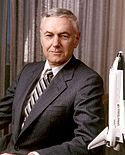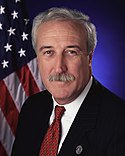Administrator der NASA

Der Administrator der NASA ist der Leiter der National Aeronautics and Space Administration (NASA), der Weltraumorganisation der Vereinigten Staaten. Zudem ist er der raumfahrtwissenschaftliche Berater des Präsidenten der Vereinigten Staaten.
Erster NASA-Administrator wurde im Jahre 1958 Thomas Keith Glennan. Vor der Gründung der NASA waren die verschiedenen staatlichen Forschungs- und Entwicklungsprojekte der Raumfahrt auf verschiedene Stellen verteilt. Eine seiner ersten Aufgaben war es daher, diese unter der neuen Behörde zu vereinen.[1]
Daniel Goldin hielt mit über neuneinhalb Jahren bislang den Posten für die längste Zeit.[2] Die einzige Person, die die Stelle zweimal innehatte, war James C. Fletcher, der nach dem Challenger-Unglück zur NASA zurückkehrte.[3]
Der am längsten amtierende kommissarisch stellvertretende Administrator war John R. Dailey, der die Stelle nach seiner Pensionierung vom United States Marine Corps antrat.[4] Der längste stellvertretende Administrator war Hugh Latimer Dryden, der erste stellvertretende Administrator der NASA überhaupt.[5] William R. Graham und Frederick D. Gregory hielten die Position des stellvertretenden Administrators zweimal, und waren dazwischen jeweils kommissarischer Administrator.[6][7] Daniel Mulville war zweimal kommissarischer stellvertretender Administrator und dazwischen kommissarisch Administrator.[8]
Liste
| Foto | Name | Beginn der Amtszeit | Ende der Amtszeit | Länge der Amtszeit | Beleg |
|---|---|---|---|---|---|
 | T. Keith Glennan | 19. August 1958 | 20. Januar 1961 | 885 Tage | [9] |
 | Hugh L. Dryden (kommissarisch) | 21. Januar 1961 | 14. Februar 1961 | 24 Tage | [9] |
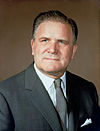 | James E. Webb | 14. Februar 1961 | 7. Oktober 1968 | 2792 Tage | [9] |
 | Thomas O. Paine (kommissarisch) | 8. Oktober 1968 | 21. März 1969 | 164 Tage | [9] |
| Thomas O. Paine | 21. März 1969 | 15. September 1970 | 543 Tage | [9] | |
 | George M. Low (kommissarisch) | 16. September 1970 | 26. April 1971 | 222 Tage | [9] |
 | James C. Fletcher | 27. April 1971 | 1. Mai 1977 | 2196 Tage | [9] |
 | Alan M. Lovelace (kommissarisch) | 2. Mai 1977 | 20. Juni 1977 | 49 Tage | [9] |
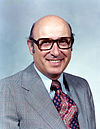 | Robert A. Frosch | 21. Juni 1977 | 20. Januar 1981 | 1309 Tage | [9] |
 | Alan M. Lovelace (kommissarisch) | 21. Januar 1981 | 10. Juli 1981 | 170 Tage | [9] |
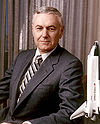 | James M. Beggs | 10. Juli 1981 | 4. Dezember 1985 | 1608 Tage | [9] |
 | William R. Graham (kommissarisch) | 4. Dezember 1985 | 11. Mai 1986 | 158 Tage | [9] |
 | James C. Fletcher | 12. Mai 1986 | 8. April 1989 | 1062 Tage | [9] |
 | Dale D. Myers (kommissarisch) | 8. April 1989 | 13. Mai 1989 | 35 Tage | [9] |
 | Richard H. Truly (kommissarisch) | 14. Mai 1989 | 30. Juni 1989 | 47 Tage | [9] |
| Richard H. Truly | 1. Juli 1989 | 31. März 1992 | 1004 Tage | [9] | |
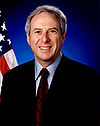 | Daniel S. Goldin | 1. April 1992 | 17. November 2001 | 3517 Tage | [9] |
 | Daniel R. Mulville (kommissarisch) | 19. November 2001 | 21. Dezember 2001 | 32 Tage | [9] |
 | Sean O’Keefe | 21. Dezember 2001 | 11. Februar 2005 | 1148 Tage | [9] |
 | Frederick D. Gregory (kommissarisch) | 11. Februar 2005 | 14. April 2005 | 62 Tage | [9] |
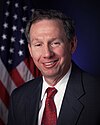 | Michael D. Griffin | 14. April 2005 | 20. Januar 2009 | 1377 Tage | [9] |
 | Christopher Scolese (kommissarisch) | 21. Januar 2009 | 16. Juli 2009 | 176 Tage | [9] |
 | Charles F. Bolden, Jr. | 17. Juli 2009 | 19. Januar 2017 | 2743 Tage | [9] |
 | Robert M. Lightfoot (kommissarisch) | 20. Januar 2017 | 22. April 2018 | 458 Tage | [9] |
| Jim Bridenstine | 23. April 2018 | 20. Januar 2021 | 1003 Tage | [9] | |
 | Steve Jurczyk (kommissarisch) | 20. Januar 2021 | 3. Mai 2021 | 103 Tage | [9] |
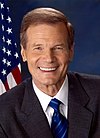 | Bill Nelson | 3. Mai 2021 | amtierend | – | [10] |
Stellvertretende Administratoren
| Foto | Name | Beginn der Amtszeit | Ende der Amtszeit | Länge der Amtszeit | Beleg |
|---|---|---|---|---|---|
 | Hugh L. Dryden | 19. August 1958 | 2. Dezember 1965 | 2662 Tage | [9] |
 | Robert C. Seamans, Jr. | 21. Dezember 1965 | 5. Januar 1968 | 745 Tage | [9] |
 | Thomas O. Paine | 25. März 1968 | 20. März 1969 | 360 Tage | [9] |
 | George M. Low | 3. Dezember 1969 | 5. Juni 1976 | 2376 Tage | [9] |
 | Alan M. Lovelace | 2. Juli 1976 | 10. Juli 1981 | 1834 Tage | [9] |
 | Hans Mark | 10. Juli 1981 | 1. September 1984 | 1149 Tage | [9] |
 | William R. Graham | 25. November 1985 | 4. Dezember 1985 | 9 Tage | [9] |
| 11. Mai 1986 | 1. Oktober 1986 | 143 Tage | [9] | ||
 | Dale D. Myers | 6. Oktober 1986 | 13. Mai 1989 | 950 Tage | [9] |
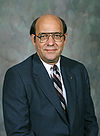 | James R. Thompson, Jr. | 6. Juli 1989 | 8. November 1991 | 885 Tage | [9] |
 | Aaron Cohen (kommissarisch) | 19. Februar 1992 | 1. November 1992 | 256 Tage | [9] |
 | John R. Dailey (kommissarisch) | 3. November 1992 | 31. Dezember 1999 | 3173 Tage | [9] |
 | Daniel Mulville (kommissarisch) | 1. Januar 2000 | 19. November 2001 | 688 Tage | [9] |
| 21. Dezember 2001 | 11. August 2002 | 233 Tage | [9] | ||
 | Frederick D. Gregory | 12. August 2002 | 20. Februar 2005 | 923 Tage | [9] |
| 14. April 2005 | 4. November 2005 | 204 Tage | [9] | ||
 | Shana Dale | 4. November 2005 | 17. Januar 2009 | 1171 Tage | [9] |
 | Lori Garver | 17. Juli 2009 | 6. September 2013 | 1513 Tage | [9] |
 | Dava Newman | 15. Mai 2015 | 19. Januar 2017 | 615 Tage | [9] |
 | Krista Paquin (kommissarisch) | 11. September 2017 | Ende Mai 2018 | ≤ 262 Tage | [9][11] |
 | James Morhard | 17. Oktober 2018 | 20. Januar 2021 | 826 Tage | [9] |
 | Pam Melroy | 21. Juni 2021 | amtierend | – | [12] |
Siehe auch
- Länderstatistik der bemannten Raumfahrt
- National Advisory Committee for Aeronautics
- Liste der Raumfahrer
- Liste der bemannten Raumflüge
Einzelnachweise
- ↑ T. Keith Glennan biography. NASA, abgerufen am 17. Juli 2009 (englisch).
- ↑ NASA: Daniel Saul Goldin. 4. November 2009, abgerufen am 6. Juni 2023 (englisch).
- ↑ James C. Fletcher biography. NASA, abgerufen am 17. Juli 2009 (englisch).
- ↑ General John R. Dailey biography. NASA, abgerufen am 17. Juli 2009 (englisch).
- ↑ Hugh L. Dryden biography. NASA, abgerufen am 17. Juli 2009 (englisch).
- ↑ William R. Graham biography. NASA, abgerufen am 17. Juli 2009 (englisch).
- ↑ Frederick D. Gregory biography. NASA, abgerufen am 17. Juli 2009 (englisch).
- ↑ Daniel Mulville biography. NASA, abgerufen am 17. Juli 2009 (englisch).
- ↑ a b c d e f g h i j k l m n o p q r s t u v w x y z aa ab ac ad ae af ag ah ai aj ak al am an ao ap aq ar as at au List of Administrators and Deputy Administrators of NASA. NASA, abgerufen am 17. Juli 2009 (englisch).
- ↑ Bill Nelson sworn in as NASA’s new administrator. News 13, 3. Mai 2021.
- ↑ Steve Jurczyk Appointed NASA Associate Administrator; Krista Paquin Retires; Melanie W. Saunders Named Acting Deputy Associate Administrator. NASA-Pressemeldung vom 21. Mai 2018.
- ↑ Pam Melroy Sworn in as NASA Deputy Administrator. NASA-Pressemeldung vom 21. Juni 2021.
Auf dieser Seite verwendete Medien
Major General Charles F. Bolden, Jr
Portrait, Jim Bridenstine Administrator, National Aeronautics and Space Administration (NASA), Thursday, April 26, 2018 at NASA Headquarters in Washington. Photo Credit: (NASA/Bill Ingalls)
Dr. Hugh Latimer Dryden, had many titles after his name in his lifetime. In 1949 he became the director of the National Advisory Committee for Aeronautics (NACA).
Dr. Dryden received many accolades and awards both during his life and after his death, but the greatest and most appropriate honor came on March 26, 1976, when NASA renamed the NASA Flight Research Center as the NASA Hugh L. Dryden Flight Research Center. At the dedication ceremony NASA Administrator James C. Fletcher stated:
"in 1924, when the fastest racing planes did well to fly at 280 m.p.h., Dryden was already probing the transonic range of . . . flight. Later in the 1920s, he sought to develop methods of accurately measuring . . . turbulence in wind tunnels. In 1938 he was the first American to deliver the Wright Brothers lecture. His 'Turbulence and the Boundary Layer' became a classic summary on the subject. It is most fitting that this Flight Research Center, with its unique and highly specialized capability for solving aerospace problems, should memorialize the genius of Hugh Dryden."
Dr. Dryden was initially an aerodynamicist with the National Bureau of Standards. He did important early work in high-speed aerodynamics. In 1947 he became the director of aeronautical research for the NACA (a predecessor of the National Aeronautics and Space Administration). Two years later, he became NACA’s director, a position he held until 1958 when he became deputy administrator of NASA.Portrait, Dava J. Newman, Deputy Administrator, National Aeronautics and Space Administration (NASA), Wednesday, May 20, 2015 at NASA Headquarters in Washington.
Portrait, James Morhard, Deputy Administrator, National Aeronautics and Space Administration (NASA), Wednesday, Oct. 24, 2018 at NASA Headquarters in Washington.
T. (Thomas) Keith Glennan was the first Administrator of the National Aeronautics and Space Administration, established October 1, 1958, under the National Aeronautics and Space Act of 1958. As Administrator, Mr. Glennan headed a staff of scientists, engineers, technicians, and other employees engaged in research and development in aeronautics and space matters. In this position he was a member of the president's National Aeronautics and Space Council.
Born in Enderlin, North Dakota, on September 8, 1905, Mr. Glennan earned a degree in electrical engineering from the Sheffield Scientific School of Yale University in 1927. Following graduation, he worked in the newly developed sound motion picture industry, and later became assistant general service superintendent for Electrical Research Products Company. Mr. Glennan joined the Columbia University Division of War Research in 1942, serving through the war, first as Administrator and then as Director of the U.S. Navy's Underwater Sound Laboratories at New London, Connecticut. For his work he was awarded the Medal of Merit.
Following the war Mr. Glennan became an executive of the Ansco Corp., Binghamton, New York, and became the President of the Case Institute of Technology in 1947. While serving as President at Case he also served with the Atomic Energy Commission. He was NASA's Administrator from 1958 until 1961. Mr. Glennan returned to Case in 1961 where he served until he retired in 1966. Although retired, Mr. Glennan spent two years as president of Associated Universities, Inc., an advocacy group for institutions of higher learning.
Mr. Glennan died on April 11, 1995, in Mitchellville, MD.
Mr. Glennan's portrait was painted by artist Albert Murray of New York.Aaron Cohen served as NASA Acting Deputy Administrator from February 19, 1992 to November 1, 1992. Mr. Cohen started at NASA's Johnson Space Center in 1962 working on the Apollo program. After Apollo he served as Manager of the Space Shuttle orbiter, directing the development and testing of the orbiter. In 1986 he assumed the position of Johnson Space Center Director. After retiring from NASA in 1993, Mr. Cohen became the Zachry Professor of Engineering at his alma mater, Texas A&M University.
Frederick D. Gregory
Dr. William R. Graham served as NASA Deputy Administrator from November 25, 1985, to December 4, 1985, and as Acting Administrator from December 4, 1985, to May 11, 1986. After the appointment of James Fletcher as NASA Administrator, Dr. Graham served as Deputy Administrator from May 11, 1986, to October 1, 1986. Before joining NASA Dr. Graham was a scientific advisor and consultant to the Reagan Administration. He was also a founder of R&D Associates in the early 1970's. Dr. Graham served as Deputy Administrator for only 9 days before being appointed as NASA' Acting Administrator due to the sudden leave of absence taken by NASA Administrator James Beggs. After serving as Deputy Administrator, Dr. Graham was appointed as Science Advisor to the President in 1986.
NASA's fifth administrator was Dr. Robert A. Frosch. Born and raised in New York, Dr. Frosch attended Columbia University where he received his undergraduate and graduate degrees in theoretical physics. After graduating Dr. Frosch went to work for Hudson Laboratories where he eventually became the director.
In September 1963 Dr. Frosch moved to Washington, DC, to serve as Director of Nuclear Test Detection (Project VELA) for the Advanced Research Projects Agency. In 1966, after serving as the deputy director of the Advanced Research Projects Agency, Dr. Frosch became Assistant Secretary of the Navy for Research and Development. During the 1970's Dr. Frosch served as the Assistant Secretary General of the United Nations.
As NASA Administrator during the Carter Administration (1977-1981), Dr. Frosch oversaw the continuation of Space Shuttle development. He retired from NASA in 1981 to serve as Vice President for Research at the General Motors Research Laboratories.George M. Low, the NASA administrator for the Apollo Program.
Vice Admiral Richard H. Truly served as NASA Administrator from May 14, 1989 to March 31, 1992. Prior to becoming Administrator, Adm. Truly served as NASA's Associate Administrator for Space Flight. In this position, he led the painstaking rebuilding of the Space Shuttle program after the Challenger accident.
Adm. Truly's career began in the Navy and in 1965 he became one of the first military astronauts selected to the Air Force's Manned Orbiting Laboratory program in Los Angeles, California. He transferred to NASA as an astronaut in August 1969 then served as capsule communicator for all three Skylab missions in 1973 and the Apollo-Soyuz mission in 1975.
He was pilot for the 747/Space Shuttle Enterprise approach and landing test flights during 1977, and his first space flight was November 12-14, 1981, as pilot of Space Shuttle Columbia (STS-2).
After leaving NASA, Adm. Truly became Vice President and Director of the Georgia Tech Research Institute, Georgia Institute of Technology, in Atlanta.James M. Beggs served as NASA's sixth administrator from July 1981 to December 1985. Mr. Beggs received degrees from the U.S. Naval Academy and the Harvard Graduate School of Business Administration. He held positions at General Dynamics, Westinghouse Electric Corp., and the Summa Corp. Prior to becoming administrator, Mr. Beggs served as Associate Administrator, Office of Advanced Research and Technology at NASA from 1968-1969 and as Under Secretary of Transportation from 1969-1973. After leaving NASA in 1985, Mr. Beggs worked as a consultant.
Portrait, Robert M. Lightfoot Jr., Acting Administrator, National Aeronautics and Space Administration (NASA), Monday, Jan. 23, 2017 at NASA Headquarters in Washington.
Dr. Thomas O. Paine served as Deputy Administrator from January 31, 1968 to October 8, 1968, then as Acting Administrator from October 8, 1968, to March 21, 1969. He assumed the position of NASA Administrator on March 221, 1969 and served in that capacity until September 15, 1970. Prior to his time at NASA, Dr. Paine worked for General Electric conducting research on magnetic and composite materials. After serving as NASA Administrator, he returned to General Electric. In 1985 the White House chose him as chair of a National Commission on Space. Dr. Paine died in May 1992.
NASA Administrator Bill Nelson, pictured as a United States Senator-elect from Florida in 2000.
NASA Associate Administrator Steve Jurczyk participates in a news briefing inside the Press Site auditorium at the agency’s Kennedy Space Center in Florida on May 22, 2020, following the conclusion of the flight readiness review for NASA’s SpaceX Demo-2 mission, with NASA astronauts Robert Behnken and Douglas Hurley, to the International Space Station. This will be SpaceX’s final flight test for NASA’s Commercial Crew Program. Behnken and Hurley will fly to the orbiting laboratory in a SpaceX Crew Dragon spacecraft, launching atop a Falcon 9 rocket from Kennedy’s Launch Complex 39A. Liftoff is scheduled for 4:33 p.m. EDT on Wednesday, May 27.
Krista Paquin, Former Deputy Associate Administrator of NASA
Daniel S. Goldin was NASA longest tenured administrator, serving from April 1, 1992, to November 17, 2001. Mr. Goldin became well known for his "faster, better, cheaper" approach to cut NASA costs while still delivering a wide variety of aerospace programs. During his administration, Mr. Goldin supervised projects such as the Mars Pathfinder, Hubble Space Telescope Servicing missions, and the International Space Station.
"Dr. Robert C. Seamans, Jr., served as NASA's Deputy Administrator from December 21, 1965, to January 5, 1968. Before becoming Deputy Administrator Dr. Seamans was NASA's Associate Administrator for five years. Prior to joining NASA, Dr. Seamans was on a National Advisory Committee for Aeronautics (NACA) technical committee. Dr. Seamans had a long working relationship with MIT, where he received his master and doctorate degrees, working as a researcher and professor before his federal service and after his retirement from NASA."
Official photo portrait of Michel D. Griffin, NASA administrator.
NASA Deputy Administrator Pam Melroy, Official Portrait, Friday, June 25, 2021, NASA Headquarters Mary W. Jackson Building in Washington. Photo Credit: (NASA/Bill Ingalls)
Dale D. Myers served as NASA's Deputy Administrator from October 6, 1986, to May 13, 1989. Prior to becoming Deputy Administrator Mr. Myers served in various positions inside NASA as well as in the private sector. Mr. Myers also served as a member of the NASA Advisory Council and provided advice and counsel to NASA top management on aeronautics and space programs.
Official NASA portrait of former MSFC director James R. Thompson Jr.
Dr. James C. Fletcher served as NASA Administrator from April 27, 1971, to May 1, 1977, and from May 12, 1986, to April 8, 1989. During his first administration at NASA, Dr. Fletcher was responsible for beginning the Shuttle effort, as well as the Viking program that sent landers to Mars. He oversaw the Skylab missions and Viking probes and approved the Voyager space probe, the Hubble Space Telescope and the Apollo-Soyuz Test Project. During his second tenure, he presided over the effort to recover from the Challenger accident. Dr. Fletcher died in December 1991 of lung cancer.



















